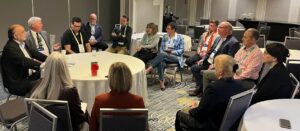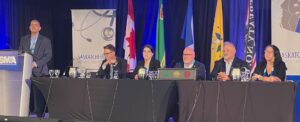Nov. 6, 2025
2025 Fall Representative Assembly focuses on themes of building and strengthening relationships
Saskatchewan Medical Association (SMA) president Dr. Pamela Arnold touched on themes of building and strengthening relationships among physicians and health system leaders during her address to the 2025 Fall Representative Assembly (RA).
Dr. Arnold noted the SMA Board of Directors decided to hold an in-person only RA for the first time in more than six years to give delegates and guests opportunities to reconnect and make new connections.
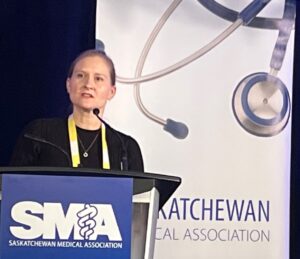 “RA delegates were clear in telling the SMA board that you want more personal contact, fewer didactic sessions and more meaningful engagement with your colleagues,” Dr. Arnold said. “Let’s strengthen the community you have and build new communities with the colleagues around you.”
“RA delegates were clear in telling the SMA board that you want more personal contact, fewer didactic sessions and more meaningful engagement with your colleagues,” Dr. Arnold said. “Let’s strengthen the community you have and build new communities with the colleagues around you.”
Dr. Arnold said the SMA is committed to engaging with local physicians on decisions that affect them. “It is crucial for the SMA and other organizations to involve physicians early and often in decision-making to build trust and co-create a future health system moving forward,” she said. “No one knows better what innovations and changes are needed in their home area than local physicians.”
More than 100 delegates and SMA members, and several health care system leaders, attended the Fall RA, held Oct. 24-25 in Saskatoon. The SMA presented awards or recognized longtime service during a Friday evening awards ceremony.
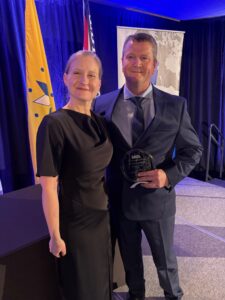 Dr. Ettiene Crouse, a longtime family physician in Moosomin, received the 2025 Physician of the Year Award. Click here for more on Dr. Crouse.
Dr. Ettiene Crouse, a longtime family physician in Moosomin, received the 2025 Physician of the Year Award. Click here for more on Dr. Crouse.
The SMA also presented 2025 Leadership Awards in four categories. Click here for more on the Leadership Award recipients. They are:
- Physician Leader of the Year: Dr. Puneet Kapur
- Early Career Physician Leader of the Year: Dr. Mary Kinloch
- Resident Leader of the Year: Dr. Ava Bayat
- Student Leader of the Year: Zoey Bourgeois
The SMA also presented the 2025 SMA Service Award, which recognizes contributions to the SMA on committees, the board or in other activities that support the SMA and its mission. The recipient is Prince Albert family physician Dr. Stan Oleksinski. Click here for more on the SMA Service Award.
The SMA Board of Directors Appreciation Award was presented to Dr. Annette Epp, SMA president in 2023-24. Physicians recognized for their years of service to the Rural Relief Program were Dr. Francois Reitz and Dr. Teja Rossmeisl (20 years each), and Dr. Rob Horan (10 years).
President’s Address
Dr. Arnold also highlighted the following in her address to delegates:
- During the SMA President and Vice-President’s Tour, physicians spoke more about their distress compared to previous years. Physicians face increased patient complexity, often with decreased resources. Concerns raised will be shared directly with the Minister of Health, dean of the College of Medicine, and with SHA leadership, including physician leaders.
- The current negotiated agreement expires March 31, 2026. Many factors will be considered when preparing for and initiating negotiations, including readiness on both sides to come to the table. Physicians will be engaged early and often for input.
- The Innovation Fund, negotiated as part of the agreement, is truly a one of kind innovation in Canada. Physicians were asked for ideas, and they responded with projects that will advance family physician-led, team-based care under the Patient’s Medical Home model. In total, 28 fee-for-service, team-based projects have been approved.
- The SMA’s work in the equity, diversity, and inclusion (EDI) space is another area of innovation. On Sept. 26-27, 2025, the SMA hosted a highly successful and inspirational EDI conference. The conference reinforced the SMA’s leadership in Canada in tackling EDI issues in medicine. The speakers and session leaders recommended actions that will further the SMA’s EDI work.
- Discussions continue with the Ministry of Health regarding the non-fee-for-service letter of agreement and physician contracts, urgent care centres, and the Health Human Resources Action Plan, among other issues. The SMA is partnering with the Ministry and the SHA to advocate for physicians and to include the physician voice while implementing the 14 recommendations in the Regina External Review report.
Table Talk
RA attendees gathered at one of four tables to discuss a topic at each table, or to circulate among the tables. SMA board members moderated the discussions. The four topics were:
- Physician Recruitment and Retention. Drs. Carla Holinaty and Morgan Hewitt moderated the discussion, which included topics such as changing admissions policies at the College of Medicine to attract local students who are more likely to stay and work in Saskatchewan long term; eliminating barriers to licensure; enabling people in a community to recruit physicians, in conjunction with provincial recruitment drives, and introducing physicians to people and amenities in those communities so they know beforehand what they are coming to.
- Physician Health and Wellbeing. Drs. Brady Bouchard and Breanna Davis moderated the discussion. Physicians at the table noted deficiencies in resources and number of physicians and health care staff are leading to moral distress. They also discussed AI scribes as a possible solution to reducing administrative burdens; creating more transparency for patients and providers – for example on wait times for procedures – which would lesson patient frustrations; and establishing and maintaining relationships with other providers and health system leaders.
- Contracts and Compensation: Drs. Geethan Chandran and Sarah Liskowich moderated the discussion, which included the following topics: contracts are diverse and variable across physician types – no one contract fits all; a better data collection system would assure physicians that their contracts are fair; and the modes of compensation and related services are changing as more physicians choose contracts over fee-for-service.
- Strengthening Physician Engagement and Relationships: Drs. Sanchit Bhasin and Jay Kalra moderated the discussion. Topics raised included: establishing regular physician-to-physician and physician-to-organization touchpoints; creating social spaces such as physician lounges to enhance collegiality; Medical Staff Association (MSA) events as a means to promoting interactions and friendships.
SHA Senior Physician Leadership Update
SHA physician leaders made a presentation to delegates. They were Dr. Rashaad Hansia (Chief Medical Officer), Dr. Jenny Basran (Deputy CMO, Quality and Digital Health), Dr. Alan Beggs (DCMO, Integrated Regina Health), Dr. Johann Roodt (DCMO, Integrated Rural Health), Dr. Dorothy Thomas (DCMO, Provincial Physician Affairs), and Dr. Mark Fenton (DCMO, Integrated Saskatoon Health). Highlights included:
- The SHA leadership team is aiming for a culture change and is asking physicians to help mold the culture they want. The SHA seeks a true partnership where everyone works together as a team toward the vision of “Healthy people, healthy Saskatchewan.”
- Structural changes by the SHA provide more accountability and hopefully clarify for physicians with whom they should connect. A challenge will be to find ways and avenues to connect. Meaningful relationships can improve job satisfaction, retain current physicians, and recruit new physicians. The SHA hopes to enhance the province’s reputation as a place where physicians want to stay and work.
- SHA leaders are committed to being accessible to physicians and their MSAs and to collaborating on issues of mutual importance.
Resolutions 101
Reché McKeague, K.C., SMA General Counsel, explained the work of the Resolutions Committee and resolutions process. She noted SMA staff confirm both mover and seconder are RA delegates, check if a similar resolution was approved in the past, and send the resolution to the Resolutions Committee. The committee reviews and amends the resolution, when appropriate, and discusses suggestions with the mover/seconder.
Once the resolution is presented to the RA, it is the RA’s resolution and no longer belongs to the mover and seconder. If it passes, SMA staff recommend a course of action to the board. The board decides whether and how to advance the resolution based on factors including alignment with the SMA’s strategic priorities, impact to the membership, and available resources. The SMA president updates the status of resolutions at each RA.
SHA Bylaws and Rules: Update and Input
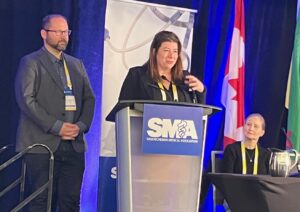 Drs. Bhasin, Bouchard, Chandran, and Davis, the SMA’s representatives on the SHA’s Bylaws and Rules Review Committee (BRRC), made a presentation to delegates. They noted the BRRC has completed work on updating the bylaws, with the Provincial Practitioner Advisory Committee having recently recommended this new version be approved by the SHA Board at its upcoming meeting in December. Once approved, they will go to the Minister of Health for final sign-off. The BRRC is now considering the rules, which must comply with the bylaws and are the operational component of the bylaws. The bylaws outline what must be done, and the rules specify how to do it.
Drs. Bhasin, Bouchard, Chandran, and Davis, the SMA’s representatives on the SHA’s Bylaws and Rules Review Committee (BRRC), made a presentation to delegates. They noted the BRRC has completed work on updating the bylaws, with the Provincial Practitioner Advisory Committee having recently recommended this new version be approved by the SHA Board at its upcoming meeting in December. Once approved, they will go to the Minister of Health for final sign-off. The BRRC is now considering the rules, which must comply with the bylaws and are the operational component of the bylaws. The bylaws outline what must be done, and the rules specify how to do it.
RA attendees were invited to gather at one of four tables to share their thoughts on the following four topics that will be the focus of upcoming rules discussions:
- Leave of absence/vacations. Topics raised included: the need for clarity on who considers requests are appropriate; physicians may have to decide among themselves about requests rather than involve area leaders; the appeal process when there is disagreement; and notice requirements for planned leaves.
- Call rota. Topics raised included: consistency in compensation for calls, as differing contracts and available human resources lead to discrepancies; role of departments in determining policies and rules; and basic minimum expectations regarding physician responsibility for patients.
- Alternate dispute resolution (ADR) process. Topics raised included: use of ADRs to bypass standard processes; need for both parties to agree to the ADR process, and if there is no agreement or no resolution through ADR, the need to move quickly to formal discipline; clarity on which parties should be involved, such as mediators, administrators, lawyers, peer support, or the SMA.
- Appointment/reappointment. Topics raised included: inappropriate use of appointments or reappointments as a disciplinary hammer, or to manage resources; support for physicians who are not reappointed; transparency of rules, processes, and consistency of criteria across departments.
Finance Committee Report
Dr. Chandran, SMA Honorary Treasurer, presented the Finance Committee Report. Highlights included:
- Demand for SMA services is increasing. The SMA board and Finance Committee has heard that physicians are in distress and in need of SMA support through the Physician Health and Workplace Wellbeing programs, advocacy, and engagement.
- Physicians are asking for more support for negotiations on contracts and compensation. The SMA requires additional resources to provide that support to the 1,400 physicians on contracts.
- The budget proposes significant investments in member services including permanent funding of the Workplace Wellbeing Team, expansion of the non-fee-for-service contract and compensation team, continued work of the EDI team and Anti-Racism Action Plan, and expansion of Physician Health Program services.
- Proposed investments in new or enhanced programs equate to a 30 per cent increase in dues over a multi-year time-period, either five years or three years. Delegates endorsed a three-year plan that would raise dues by $207 in 2026 as the first step in a proposed multi-year plan. They also approved the 2026 budget.
College of Physicians and Surgeons of Saskatchewan Report
Dr. Mark Chapelski, president, College of Physicians and Surgeons of Saskatchewan (CPSS), told delegates that the CPSS Registration Committee is under significant pressure to approve alternate routes to licensure, find acceptable alternate proof of credentials and qualifications documentation, and increase the number of internationally trained physicians.
The top CPSS quality of care issues are delayed call-backs, unclear plans, poor documentation of consent and follow-up. The CPSS recommends physicians establish and communicate expectations for access and response times to patients, use plain language, accommodate language and cultural needs, and offer interpreters when appropriate. Physicians should also respond to third-party requests in a timely and ethical fashion, and understand the implications of providing care to themselves, family and friends, employees, or close contacts.
Dr. Chapelski said patient complaints are increasing in number and complexity, adding that many files are resolved by Alternate Dispute Resolution (ADR). As of Oct. 1, 2025, 79 discipline files have been opened, compared to 82 in 2024. The top outcomes are pre-charge ADR (24), preliminary inquiry committee stage (22), physicians charged (13), and letters of concern (10).
College of Medicine Report
Dr. Janet Tootoosis, vice dean, Indigenous Health, College of Medicine, noted the class of 2029 includes 108 students, of which 68 are in Saskatoon and 40 in Regina. Eighty-four per cent are from Saskatchewan, 17 per cent have rural roots, 50 per cent are female, and three are Indigenous students. She said the college strives for admissions to reflect the provincial population with a goal of increasing the number of graduates who remain in Saskatchewan.
The response to the physician assistant masters training program, which started this fall, was overwhelming for the 20 available seats. Two master’s programs will begin in fall 2026: occupational therapy, and speech and language pathology.
Dr. Tootoosis told delegates that the college is seeking input on its strategic plan and is asking physicians to respond to a survey that will help ensure college goals align with its commitments.
Minister of Health’s Address
Health Minister Jeremy Cockrill made a presentation to delegates. He highlighted the following:
 The 2025 budget increased levels of support in several areas, including long-term care, team-based care, surgical volumes, the number of students and residency seats at the College of Medicine, mental health resources, addictions beds, acute care including additional beds at Saskatoon City Hospital, and physician compensation.
The 2025 budget increased levels of support in several areas, including long-term care, team-based care, surgical volumes, the number of students and residency seats at the College of Medicine, mental health resources, addictions beds, acute care including additional beds at Saskatoon City Hospital, and physician compensation.- Investments in team-based care support the goal for every resident to have access to primary care by 2028. The Ministry hopes to expand the Patient’s Medical Home model to other centres in the province.
- The government is starting to see success across health professions from the Health Human Resources Action Plan. The “Saskatchewan is Calling” campaign, which showcased the work and lifestyle of three physicians, has generated interest. The government is optimistic that the suite of available incentives and affordability of life in Saskatchewan will attract physicians to remote and rural communities.
- The government looks forward to the impact of the 28 fee-for-service family practice clinics approved for funding under the Innovation Fund and is pleased that more than 500 physicians have signed on to the Transitional Payment Model. The government remains committed to the transition to a blended capitation model of compensation.
- The government is planning new urgent care services for Moose Jaw, Prince Albert, and North Battleford, and second urgent care centres for Regina and Saskatoon. The Ministry is listening to feedback from physicians in these communities and will continue discussions prior to making final decisions on the centres, which will be adapted and planned based on community needs.
Keynote Speaker – Dr. Adaira Landry
Dr. Adaira Landry, assistant professor, Harvard Medical School, presented the keynote address entitled Moving from Ideas to Outcomes. She said many ideas that have the potential to be successful but are never tried. People are uncertain because of the possibility for failure or threat to their self-worth and social standing, anxiety over being vulnerable to judgment, and discomfort or anxiety over uncertainty with something new.
 She said a successful project stemming from an idea can be measured by the completion of the project, the confidence it builds for the originator of the idea, and the credibility it raises for that person among colleagues. The three pillars to success are road mapping, engaged stakeholders, and calculated iteration. Strategic road mapping involves setting goals, objectives, a mission and a vision, and developing desired outcomes that are specific, visible, and measurable. She said stakeholders must be engaged. People on the team should include allies who are engaged with the idea, skeptics who identify gaps or areas of concern, and decision-makers who can move an idea forward. Calculated iteration involves overcoming the tendency to procrastinate, ignoring negative feedback and moving forward by developing timelines and phases.
She said a successful project stemming from an idea can be measured by the completion of the project, the confidence it builds for the originator of the idea, and the credibility it raises for that person among colleagues. The three pillars to success are road mapping, engaged stakeholders, and calculated iteration. Strategic road mapping involves setting goals, objectives, a mission and a vision, and developing desired outcomes that are specific, visible, and measurable. She said stakeholders must be engaged. People on the team should include allies who are engaged with the idea, skeptics who identify gaps or areas of concern, and decision-makers who can move an idea forward. Calculated iteration involves overcoming the tendency to procrastinate, ignoring negative feedback and moving forward by developing timelines and phases.
Dr. Landry noted the key takeaways for her talk were: do not overthink an idea and wait too long to share it; do not take constructive feedback personally, as feedback is about the project, not the person; and be mindful that good ideas can take months or years to come to fruition.
The SMA’s 2026 Spring RA will be held May 8-9, 2026, at the Hotel Saskatchewan in Regina.

It is crucial for the SMA and other organizations to involve physicians early and often in decision-making to build trust and co-create a future health system moving forward. No one knows better what innovations and changes are needed in their home area than local physicians.
Dr. Pamela Arnold, SMA president

Recent Posts
-
2025 Fall Representative Assembly focuses on themes of building and strengthening relationships
November 6, 2025 -
SMA honours Moosomin family physician Dr. Ettiene Crouse as 2025 Physician of the Year
October 27, 2025 -
P.A. family physician Dr. Stan Oleksinski receives 2025 SMA Service Award
October 27, 2025
Recent Posts
-
2025 Fall Representative Assembly focuses on themes of building and strengthening relationships
November 6, 2025 -
SMA honours Moosomin family physician Dr. Ettiene Crouse as 2025 Physician of the Year
October 27, 2025 -
P.A. family physician Dr. Stan Oleksinski receives 2025 SMA Service Award
October 27, 2025

